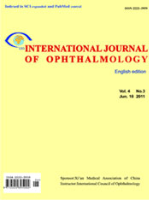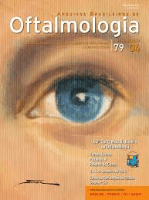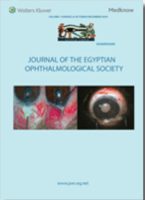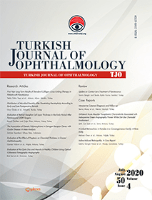
EUROPEAN JOURNAL OF OPHTHALMOLOGY
Scope & Guideline
Elevating Knowledge in Ophthalmology for Better Outcomes
Introduction
Aims and Scopes
- Clinical Ophthalmology:
Focus on clinical research, including studies on surgical techniques, treatment outcomes, and management strategies for various ocular conditions. - Diabetic Eye Disease:
A significant emphasis on diabetic retinopathy and diabetic macular edema, including their pathogenesis, screening methods, and treatment efficacy. - Innovative Surgical Techniques:
Research on novel surgical approaches and devices, including minimally invasive techniques and advancements in intraocular lens technology. - Ocular Imaging:
Utilization of advanced imaging technologies such as optical coherence tomography (OCT) and angiography to diagnose and monitor ocular diseases. - Artificial Intelligence in Ophthalmology:
Integration of AI and machine learning in diagnosing and managing ocular diseases, emphasizing the role of technology in enhancing clinical decision-making. - Public Health and Epidemiology:
Studies addressing the epidemiology of eye diseases, including risk factors, prevalence, and the socioeconomic impacts of visual impairment.
Trending and Emerging
- Teleophthalmology and Remote Care:
The rise of telemedicine, particularly in response to the COVID-19 pandemic, has led to increased research on remote diagnosis and management of ocular conditions. - Diabetic Eye Disease Innovations:
A growing focus on new therapies and technologies for managing diabetic retinopathy and diabetic macular edema, including the use of intravitreal injections and novel imaging techniques. - AI and Machine Learning Applications:
Significant interest in the application of artificial intelligence for early detection, diagnosis, and management of eye diseases, indicating a technological shift in ophthalmology. - Ocular Surface Disease and Dry Eye Management:
An increase in research dedicated to understanding and managing ocular surface diseases, particularly dry eye syndrome, reflecting a growing awareness of its prevalence and impact. - Genetic and Molecular Research:
Emerging studies on the genetic basis of ocular diseases and the role of molecular markers in disease progression and treatment response. - Choroidal and Retinal Imaging Advances:
A trend towards utilizing advanced imaging modalities such as OCT angiography to assess choroidal and retinal diseases, enhancing diagnostic capabilities.
Declining or Waning
- Traditional Surgical Techniques:
There is a noticeable decrease in publications focusing on conventional surgical techniques, as the field shifts toward more innovative and minimally invasive approaches. - Basic Science Research:
The journal has seen fewer articles dedicated to basic science aspects of ophthalmology, such as histopathological studies, in favor of clinical and translational research. - Historical Perspectives:
The publication of articles that explore historical aspects of ophthalmology has diminished, indicating a move towards contemporary research and current clinical challenges. - Pharmacological Treatments for Common Eye Conditions:
Research on established pharmacological treatments for common conditions like glaucoma has waned, possibly due to a shift towards exploring newer treatment modalities and combination therapies.
Similar Journals

Nepalese Journal of Ophthalmology
Transforming Ophthalmology with Cutting-edge ResearchNepalese Journal of Ophthalmology, established by the NEPAL OPHTHALMIC SOC, is a premier Open Access journal dedicated to advancing the field of ophthalmology. With its ISSN 2072-6805 and E-ISSN 2091-0320, the journal provides an important platform for sharing innovative research and clinical findings in eye health. Since its inception in 2009, the journal has aimed to disseminate high-quality research that addresses contemporary challenges in ophthalmic practices, thus supporting improved patient care and outcomes within Nepal and beyond. The journal has achieved notable recognition, evidenced by its Scopus rank of #267 out of 915 in the field of General Medicine, placing it within the 70th percentile. Researchers, professionals, and students will find valuable information in its comprehensive articles, which cater to a multidisciplinary audience interested in the latest developments in ophthalmology. Emphasizing accessibility, the journal ensures that all published content is freely available, fostering collaboration and knowledge sharing in the global medical community.

JAPANESE JOURNAL OF OPHTHALMOLOGY
Advancing the Vision of OphthalmologyJapanese Journal of Ophthalmology, published by Springer Japan KK, is a premier peer-reviewed journal dedicated to advancing the field of ophthalmology. With an impressive impact reflected in its Q1 categories—ranking among the top journals in both Medicine (miscellaneous) and Ophthalmology, as per the 2023 metrics—it serves as an essential platform for researchers and professionals to disseminate their findings. Covering a broad spectrum of topics from clinical studies to innovative technologies in eye care, this journal not only supports the ongoing education of its readership but also fosters significant developments within the field. The journal, which has been in circulation since 1973 and is set to continue through 2024, offers access to vital research, thereby enabling practitioners and scholars to keep abreast of the latest advancements. Its distinguished Scopus ranking of #30 out of 137 in Medicine - Ophthalmology, placing it in the 78th percentile, further underscores its influence and importance in contributing to the global understanding of eye health.

International Journal of Ophthalmology
Elevating Ophthalmic Science for a Brighter FutureThe International Journal of Ophthalmology, with ISSN 2222-3959 and E-ISSN 2227-4898, is a premier open-access publication dedicated to advancing the field of ophthalmology. Published by IJO PRESS in China, this journal has been a valuable resource since its inception in 2005, providing a platform for groundbreaking research and clinical studies in ophthalmic science. With an impressive Q2 ranking in the 2023 Ophthalmology category and a Scopus rank of #65 out of 137, the journal consistently showcases high-quality articles that contribute significantly to the understanding and treatment of eye diseases. Since adopting an open-access model in 2010, it has expanded its reach, allowing researchers, professionals, and students worldwide to access vital knowledge in the field. The journal aims to bridge the gap between laboratory research and clinical practice, making it an essential resource for those committed to improving visual health and advancing ophthalmologic education and innovation.

Translational Vision Science & Technology
Advancing the Frontiers of Vision Science and TechnologyTranslational Vision Science & Technology is a premier open access journal dedicated to the advancement of the field of ophthalmology and biomedical engineering. Published by the Association for Research in Vision and Ophthalmology, Inc., this journal has established itself as a leading source of high-quality research since its inception in 2013, achieving a remarkable impact factor reflective of its influential contribution to the field. With an impressive ranking of #21 in Ophthalmology and #120 in Biomedical Engineering within the Scopus database, it sits within the prestigious Q1 quartile for both categories as of 2023, further validating its significance. The journal's scope encompasses a wide variety of topics focused on the intersection of ophthalmological science and technological innovation, welcoming contributions that promote the understanding and treatment of visual disorders. Available as an Open Access publication since 2016, it ensures that cutting-edge research is freely accessible to researchers, practitioners, and students worldwide, facilitating the rapid dissemination of knowledge essential for the advancement of vision science.

ARQUIVOS BRASILEIROS DE OFTALMOLOGIA
Elevating the standards of ophthalmology through shared knowledge.ARQUIVOS BRASILEIROS DE OFTALMOLOGIA is a prominent peer-reviewed journal dedicated to the field of ophthalmology, published by CONSEL BRASIL OFTALMOLOGIA since its inception in 1945. With its commitment to disseminating high-quality research, the journal has transitioned to an Open Access model since 2001, ensuring that vital findings in ophthalmology are freely available to researchers, clinicians, and students alike. Located in São Paulo, Brazil, this esteemed publication occupies a significant position in the medical field, currently holding a Q3 ranking in both the miscellaneous medicine and ophthalmology categories. Although it maintains a legacy of fluctuating impact, recognized for its contribution to the academic community, ARQUIVOS BRASILEIROS DE OFTALMOLOGIA continues to attract a diverse international readership, making it a valuable resource for advancements in eye health, surgical techniques, and ocular research.

Journal of the Egyptian Ophthalmological Society
Elevating the standards of ophthalmological excellence.Journal of the Egyptian Ophthalmological Society is a premier academic journal dedicated to advancing the field of ophthalmology through high-quality peer-reviewed research. Published by Wolters Kluwer Medknow Publications, this journal plays a critical role in disseminating vital findings and innovations in eye care, fostering knowledge exchange among researchers, practitioners, and educators worldwide. Since its transformation to Open Access in 2014, it has significantly enhanced the accessibility of eye health information, thereby broadening its impact on the global scientific community. With an ISSN of 2090-0686 and an E-ISSN of 2314-6648, the journal aims to tackle contemporary issues in ophthalmology, including clinical practices, public health, and technological advancements in eye care. The journal's commitment to excellence ensures that it remains a vital resource for those looking to contribute meaningfully to this dynamic and crucial field.

BRITISH JOURNAL OF OPHTHALMOLOGY
Leading the Way in Ophthalmology ResearchThe British Journal of Ophthalmology, published by the BMJ Publishing Group, stands as a leading peer-reviewed journal in the field of ocular sciences, with a distinctive focus on advancing the understanding of vision and its impairment. With a rich history dating back to 1941, this journal serves as an essential platform for researchers, professionals, and students in ophthalmology and related disciplines. It prominently ranks in the Q1 quartile for Ophthalmology and Cellular and Molecular Neuroscience in 2023, reflecting its esteemed reputation in the scientific community. The journal boasts impressive Scopus rankings, including Rank #6 in Medicine - Ophthalmology, showcasing its influential contributions to the field. Although it does not offer open access, the journal is committed to disseminating high-quality research that informs clinical practices and enriches the understanding of sensory systems. Submissions are encouraged from all areas of ophthalmology, including clinical studies, innovative research, and systemic reviews. Join the vibrant academic dialogue by engaging with the cutting-edge findings published in the British Journal of Ophthalmology, which aims to bridge the gap between research and clinical application.

Augenheilkunde Up2date
Enhancing Expertise in Vision Science.Augenheilkunde Up2date is a pivotal journal in the field of ophthalmology, published by GEORG THIEME VERLAG KG, a renowned publisher known for its commitment to advancing medical knowledge. With its ISSN 1616-9719 and E-ISSN 1616-9735, this journal serves as a vital resource for researchers, professionals, and students interested in the latest developments and nuanced discussions in eye health. Although not available as open access, its curated content offers significant insights into contemporary research, clinical practices, and emerging trends in ophthalmology, thus promoting the continuous professional development of its readers. There is an emphasis on providing comprehensive reviews that encapsulate the pertinent advancements in the field, making it an essential publication for those aiming to enhance their expertise in eye care and vision science.

Asia-Pacific Journal of Ophthalmology
Leading the charge in ophthalmic advancements.Asia-Pacific Journal of Ophthalmology is a distinguished open access journal published by the Asia-Pacific Academy of Ophthalmology (APAO), specializing in the latest advancements and research in ophthalmology. Since its inception in 2013, this journal has established itself as a vital platform for disseminating innovative findings and clinical practices across the Asia-Pacific region and beyond. With an impressive Scopus ranking of #10 out of 137 in the field of Medicine (Ophthalmology), placing it in the 93rd percentile, it garners significant attention and respect within the academic community. Currently holding a Q1 categorization in both Medicine (miscellaneous) and Ophthalmology, the journal embraces a broad scope that encompasses clinical studies, experimental research, and reviews aimed at enhancing the understanding and management of eye health. Its open access model since 2019 ensures that all published works are freely accessible, promoting greater collaboration and knowledge sharing among researchers, clinicians, and students. Situated in the Netherlands with a prominent address in Hong Kong, the journal serves as an essential resource for anyone dedicated to the field of ophthalmology.

Turk Oftalmoloji Dergisi-Turkish Journal of Ophthalmology
Exploring the Frontiers of Ocular ScienceTurk Oftalmoloji Dergisi - Turkish Journal of Ophthalmology is a premier peer-reviewed publication dedicated to the field of ophthalmology, published by GALENOS PUBL HOUSE. Since its inception in 1997, this Open Access journal has championed the dissemination of high-quality research, fostering an inclusive environment for sharing knowledge and advancements in eye health. With an ISSN of 1300-0659 and an E-ISSN of 2147-2661, the journal serves as a vital resource for researchers, clinicians, and students interested in the latest findings and innovations in ophthalmic sciences. Although its coverage in Scopus has been discontinued since 2017, the journal has garnered a significant rank of 80 out of 114 in the field of Medicine – Ophthalmology, highlighting its relevance and impact within the discipline. Operating out of Istanbul, Turkey, the Turkish Journal of Ophthalmology continues to be a crucial platform for ophthalmologists and researchers to publish their work and advance the understanding of ocular health.